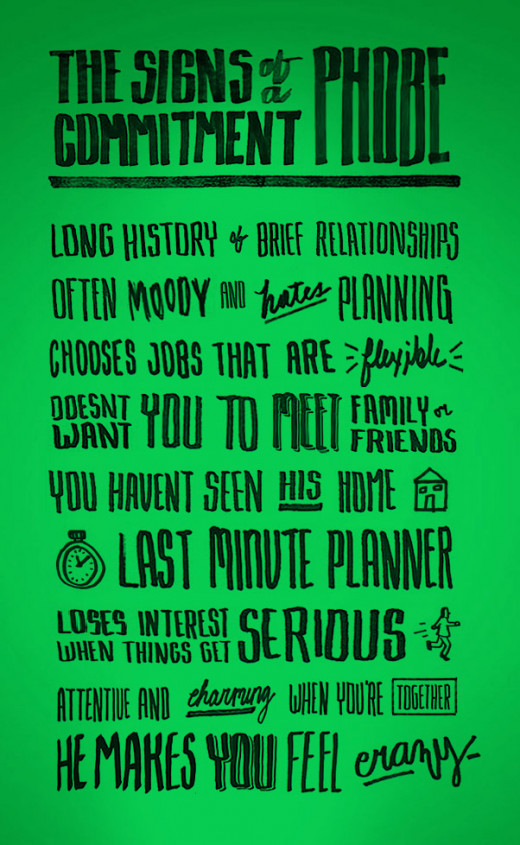What is Commitment Phobia and does It Really Exist?
So many people seem to be afraid of genuine love and actual commitment. These people have been hurt in the past, which makes the unwilling to open up and be vulnerable. Every one of us has probably been in this position during a certain period.
Commitment phobia, however, is something completely different. Does it really exist, are you dating a commitment-phobic person and could the problem be overcome? Keep on reading to find out.
What is Commitment Phobia?
Commitment-phobic individuals find it very difficult, sometimes even impossible to stay in a long-term relationship. This doesn’t mean that they don’t experience love. The feeling and its intensity, however, are perceived as scary rather than uplifting.
Sometimes, commitment phobia stems from past trauma. An abusive relationship or problems inside the family could make people unwilling to form deeper, more meaningful bonds with others.
Other people are frightened by the fact that they’re accepting some responsibility for another person, their feelings and happiness by being in a relationship. These people find it difficult to keep their own life together and the fact that somebody else would be entering it happens to be terrifying.
Finally, in the case of commitment phobia, anxiety and excitement could end up being confused with each other. Most people enjoy the sensation of waiting for a significant other before going out on a date. For someone that’s commitment-phobic, however, this feeling will be much more reminiscent of intense anxiety rather than something possible.

Are You Dating Someone that’s Commitment-Phobic?
Is the person that you’re currently dating finding it difficult to open up or are they actually commitment-phobic? You can read the sign because some of those are impossible to go unnoticed:
- They have a history of short past relationships: for some people, short past relationships could be indicative of poor choices in partner. For others, this is a certain sign of commitment phobia. This is particularly true for relationships that didn’t feature a serious level of commitment or emotional attachment.
- Inability to make plans for the future: while most couples enjoy the process of planning future dates and activities together, the individuals that suffer from commitment phobia will be incredibly uncomfortable about it. Such plans could actually be a source of fear.
- They are promiscuous: many people that are commitment-phobic consider monogamy to be unnatural and they’re promiscuous, even when in a relationship. To compensate for the lack of emotional intimacy with another person, these individuals are very likely to get physical quickly and with people that they don’t know too well.
- You don’t know their friends or family: acquainting you with friends and family would mean that things are getting serious and someone that has commitment phobia wouldn’t enjoy that. As a result, the relationship will be very likely to remain low profile.
- You don’t do a lot together apart from sex: how often have you sat down to talk, to play a game or practice a hobby together? Does your relationship seem to be revolving solely around sex? That’s another sign you could be dating a commitment-phobic person.
- They love the chase: a commitment phobe is usually very charming and flirtatious. They love the chase, they love the steps that will make someone fall for them. Once you’ve passed through this initial process, however, it’s possible for the person to love all interest in you and in building a relationship together

In Love with a Commitment Phobe? Tips for Making a Relationship happen
We can’t control our feelings. If you’ve already fallen in love with a commitment phobe, you could be scared about the future of the relationship. There are certain things that you can do to make the other person feel more comfortable and to increase the chances of building something genuine and meaningful together.
- Pressure and ultimatums don’t work: standard dating advice isn’t going to be particularly helpful when you’re dealing with a commitment-phobic individual. You can’t pressure them to fall in love. Take it slow and don’t push very hard. Being aggressive will probably have the exact opposite effect of what you’re trying to achieve.
- Have realistic expectations: it’s a bit too early to start thinking about the white dress and having kids together. Check your fantasies and have realistic expectations. Understand the fact that it may eventually fail. Don’t get your hopes too high and enjoy what you have instead of trying to push the relationship in a certain frame.
- Stop trying to fix them: many people fall for commitment phobes because they’re attracted to the idea of fixing the bad boy or the wild girl that’s afraid of commitment. If you’re trying to change or fix someone, you aren’t building a relationship with them. You’re trying to build a relationship with what they could become in the future.
- Be patient: take your time to get to know each other better before making major declarations or trying to define the relationship. Commitment phobes have been through the same process with many others before you. If you’re overly-excited and willing to move too fast, you’ll probably lose them.
- Let them go: a person that is experiencing a commitment phobia will need to work on those inner demons before forming a meaningful relationship with anyone. Let them go if you feel that it isn’t working. With time, they could discover that what you’ve been offering is what they need. If it’s meant to be, it doesn’t have an expiration date.
Commitment phobia will probably make things difficult but remember that relationships don’t come in neat little packages. Very often, reality is quite different from your expectations. Accept what you have and work on making it better. If both of you are on the same page, chances are that you’ll be capable of moving forward.
About the author:
By Wilma Derksen, C.E.C., O.M., a winnipeg couples counsellor with White Banners (www.whitebanners.ca)








